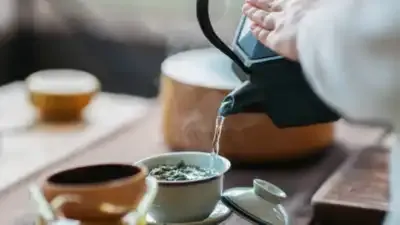
Most of us can’t start the day without a steaming cup of chai. That cozy blend of black tea, milk, and spices? Pure magic. Whether it's a mid-day pick-me-up or the first thing you sip before scrolling through the news, tea is more than just a drink—it’s a ritual. But what if your beloved chai or green tea is sneakily messing with your kidneys?
Yep, turns out your daily cuppa could be doing more than warming your soul—it might be putting some strain on your kidneys, especially if you’re going overboard or have other risk factors.
So, what’s the issue?
It’s all about oxalates—naturally occurring compounds found in many plant-based foods, including tea. When you consume too many oxalates, your body might not be able to flush them out properly. These oxalates can bind with calcium in your urine and form kidney stones. Ouch.
Black tea, in particular, is pretty high in oxalates. Some have shown that drinking very large amounts—like 6-8 cups a day—can raise your risk of kidney stone formation. Green tea and herbal teas usually have fewer oxalates, but that doesn’t mean you should chug them like water either.
Iced tea neuropathy killed man: A rare case in 2015
In one extreme case in the U.S., a man reportedly developed e after drinking 16 cups of iced tea a day. That’s an outlier, sure, but it does raise eyebrows. The puzzling case of the 56-year-old U.S. man who suddenly developed weakness, fatigue and body aches in 2015 was termed as iced-tea nephropathy by the New England Journal of Medicine, which published a letter describing the case. The man reported that he was drinking 16 nine-ounce glasses of iced tea each day, giving him more than 1,500 milligrams of oxalate per day. The Academy of Nutrition and Dietetics advises consuming no more than 40-50 mg of oxalate per day, the authors note.
Do you consume Indian tea?
Traditional masala chai uses black tea as a base—so yes, it does contain oxalates. But there’s more to it. We usually boil the tea leaves with milk, and milk contains calcium. Ironically, the calcium in milk can actually bind to oxalates in your gut before they enter your bloodstream—preventing them from reaching your kidneys. So, chai with milk might be slightly less risky than straight black tea. Score one for team masala!
Still, if you’re someone prone to kidney stones or have a family history, moderation is your best friend. Stick to 2–3 cups a day and you’re probably fine.
Green tea: Better or worse?
Green tea contains less oxalate than black tea, and it’s often hyped for its antioxidant benefits. But even green tea isn’t totally off the hook. Overconsumption—especially in concentrated extract form like in weight-loss supplements—has been linked to kidney and liver issues. Again, it all comes down to balance.
Are there other hidden tea risks for kidneys?
Yup. Many packaged teas (especially instant varieties or sugary tea lattes) contain phosphorus additives or high sodium, both of which can be harmful to people with existing kidney problems. People with chronic kidney disease (CKD) are often told to limit foods with high potassium and phosphorus. So if you’re sipping on overly processed tea blends with tons of sweeteners or flavorings, your kidneys might not love it.
-
Dilli, teri jaan will never know what the @!$#'ll happen in this town

-
Understanding India's cultural representation: The impact of Operation Sindoor

-
Vande Bharat train between Katra, Srinagar begins today; slashes travel time to just 3 hours

-
Thailand 'deeply saddened' by death of Gaza hostage: Ministry

-
Sweden probes massive sabotage after 30 telecom masts attacked in what officials call a coordinated strike
